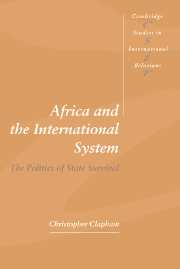Book contents
- Frontmatter
- Contents
- Acknowledgements
- List of acronyms and abbreviations
- Part I African states and global politics
- Part II Patterns of alliance
- 4 The Foreign Policies of Post-Colonialism
- 5 The politics of solidarity
- 6 The resort to the superpowers
- Part III Struggling with decay
- Notes
- Bibliography
- Index
- CAMBRIDGE STUDIES IN INTERNATIONAL RELATIONS 50
4 - The Foreign Policies of Post-Colonialism
Published online by Cambridge University Press: 09 October 2009
- Frontmatter
- Contents
- Acknowledgements
- List of acronyms and abbreviations
- Part I African states and global politics
- Part II Patterns of alliance
- 4 The Foreign Policies of Post-Colonialism
- 5 The politics of solidarity
- 6 The resort to the superpowers
- Part III Struggling with decay
- Notes
- Bibliography
- Index
- CAMBRIDGE STUDIES IN INTERNATIONAL RELATIONS 50
Summary
The post-colonial relationship
The peculiar character of Africa's relations with the outside world is strikingly illustrated by the fact that the first and most obvious source of external support which African rulers could look to for the maintenance of their newly acquired statehood was the very colonial power from which they had just gained independence. The relationship with the former colonial power was the only substantial external relationship which African states possessed at independence, and it was therefore bound to be central to their diplomacy; there was much to be said for trying to ensure that it would be a supportive rather than a threatening one. At the same time, it was potentially a difficult relationship, not just because of its inherent inequality – a problem which equally applied to African relations with the superpowers – but because it reached deep into the domestic structure and identity of the new state itself. It carried with it a constant reminder of the colonial past, and could never be entirely divorced from a sense of subordination. In defining their relations with the former metropole, African leaders were thus defining their relations with their own history. In the process, they also necessarily defined the point at which they sought to position themselves in relation both to the global power structure, and to the different interests and identities within their own societies which were closely associated, in one way or another, with the colonial experience.
The most important feature of the post-colonial relationship was its depth and complexity. From the viewpoint of African leaders, this was the relationship over which they could exercise least control.
- Type
- Chapter
- Information
- Africa and the International SystemThe Politics of State Survival, pp. 77 - 105Publisher: Cambridge University PressPrint publication year: 1996
- 2
- Cited by



